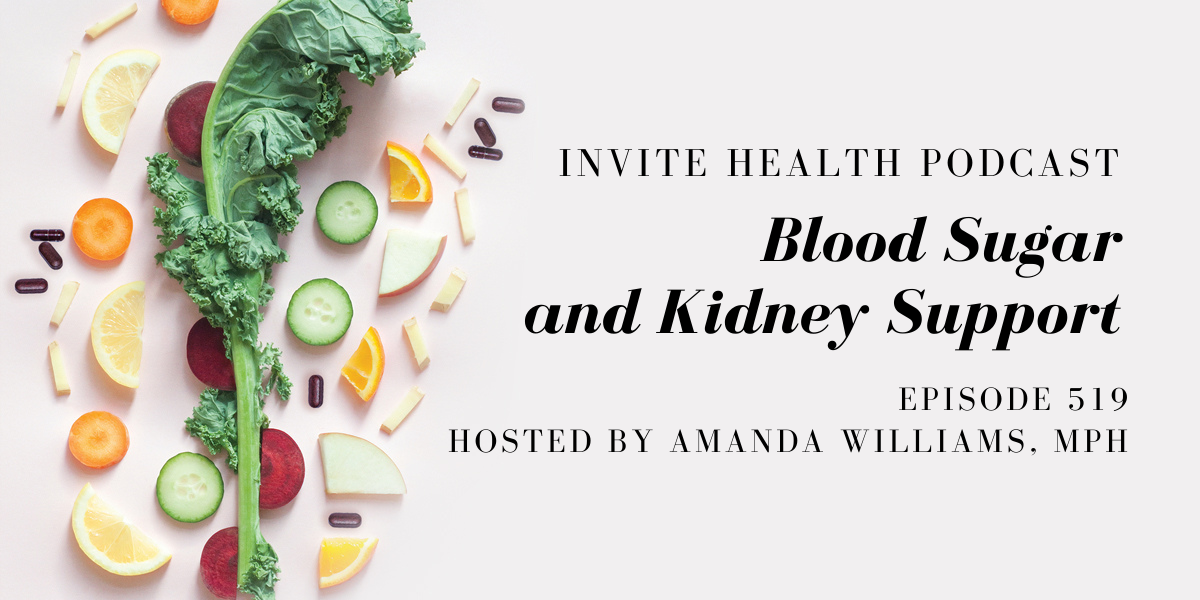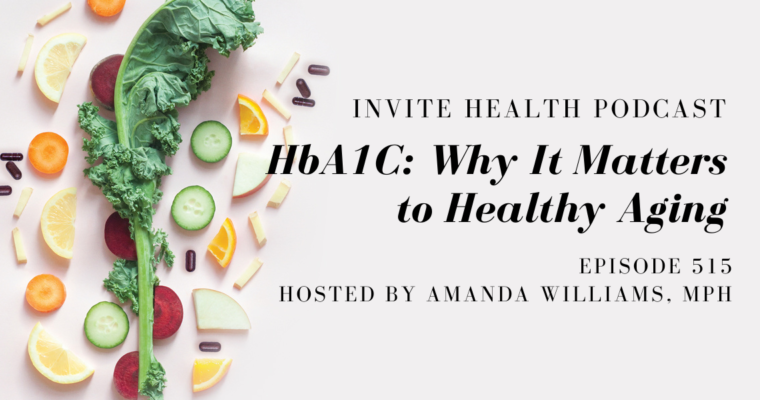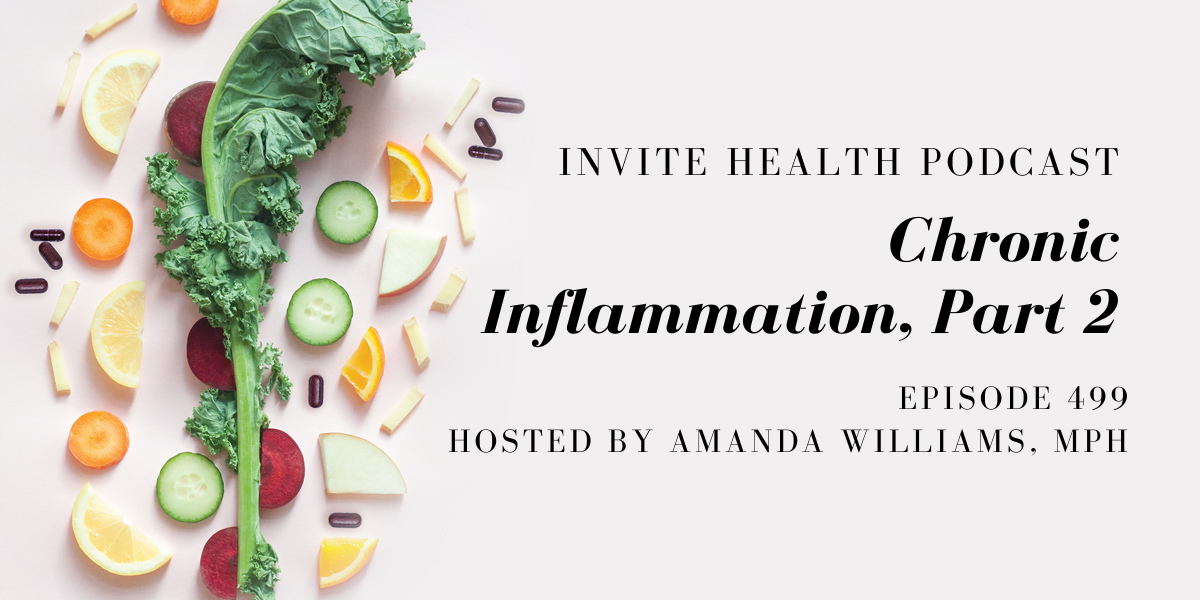inflammation
Subscribe Today!
Please see below for a complete transcript of this episode.
Chronic Inflammation, Part 2 – InViteⓇ Health Podcast, Episode 498
Hosted by Amanda Williams, MPH
*Intro music*
InVite Health Podcast Intro: Welcome to the InViteⓇ Health Podcast, where our degreed healthcare professionals are excited to offer you the most important health and wellness information you need to make informed choices about your health. You can learn more about the products discussed in each of these episodes and all that InViteⓇ Health has to offer at www.invitehealth.com/podcast. First time customers can use promo code PODCAST at checkout for an additional 15% off your first purchase. Let’s get started!
*Intro music*
Amanda Williams, MPH:
[00:00:40] Inflammaging part two. So I want to today define what nutrients are incredibly beneficial when it comes to targeting chronic inflammation. So we know that inflammaging, it’s going to be accelerated aging because of chronic inflammation. Not a good thing. So I’m going to talk about the nutrients and why it matters to make sure that we’re addressing that inflammation in the body. So I’m Amanda Williams, MD, MPH, and let’s get right to it.† [00:01:13]
[00:01:13] Let’s talk once again about chronic inflammation and why it is that when we think about the long-lasting impact of inflammation and how we can tie it to cardiovascular disease, to cancer, to diabetes, to chronic kidney disease, to nonalcoholic fatty liver disease, which we certainly see is on the rise here in this country in particular because of our diet of that high processed foods, looking at autoimmune conditions, neurodegenerative disorders, we see this. We know that there is evidence that the risk of developing chronic inflammation is known to obviously persist throughout our lives, but it goes up exponentially as we become adults because of underlying health conditions.† [00:02:08]
[00:02:08] Now what came first, the health condition or the inflammation? That’s always the big question. Well, we know that it’s the inflammation. It is through, say, glycation, for example, we have excess glucose. That glucose, which is now doing damage… The immune system is going to try to respond or react to that, so it drives up the inflammation. So a normal inflammatory response… Except in acute inflammation, we definitely want that. But it’s that chronic inflammation that we know is certainly the big issue. So seeing and understanding the implications of chronic inflammation is certainly majorly problematic.† [00:02:52]
[00:02:53] So let’s think about the outside factors that helped drive that. We can look at physical inactivity, we can look at obesity, we can look at gut dysbiosis, which is obviously going to affect our immune function, which then triggers that inflammatory response. The diet, the Standard American Diet, this is the primary causative reason for chronic inflammation. We can look at stress. If someone is continuously stressed, whether that be emotional or physical stress, this is going to drive inflammation. We can look at inadequate sleep, how that can drive inflammation. We can look at environmental exposures to different chemicals, how that can drive inflammation. And all of these are linked to metabolic syndrome, type two diabetes, cancer, depression, autoimmune conditions, osteoporosis, sarcopenia, which is age-related muscle mass loss. Immunosenescence, I talked about that in the Immune System podcast, so you can always check that out. I have a four-part series on immune health.† [00:04:01]
IMMUNE SYSTEM, PART 2: THE AGING IMMUNE SYSTEM – INVITE HEALTH PODCAST, EPISODE 492. Listen Now>>
[00:04:02] So today, let’s talk about what we can do in the setting of chronic inflammation when it comes to nutrients. Now here’s the interesting fun fact. Oftentimes people think I have inflammation, I need an anti-inflammatory. If you are going out and taking a non-steroidal anti-inflammatory for your chronic inflammation, you are not doing your body any justice. Your ibuprofen is not going to help with that chronic inflammation that’s doing that systemic damage. What we need to do is we need to basically key in on the health of the cells and what those cells need. So we can look at very basic things, magnesium, Vitamin D, Vitamin E, omega-3 fatty acids. These are all key to making sure that, at that cellular level, that the cell can function in a much more efficient way.† [00:04:56]
[00:04:56] We know that magnesium has been associated with lower levels of inflammation. They’ve been able to assess that higher serum magnesium directly correlated to lower C-reactive protein levels, lower tumor necrosis factor alpha levels. And we know that many people have magnesium insufficiency or deficiencies.† [00:05:19]

[00:05:20] We can look at Vitamin D, our hormone vitamin, and see how this plays a role in terms of an anti-inflammatory effect in the body. It does this through the inhibition of NF-kappa beta, which is a master driver or regulator for inflammation in the, in the body. They’ve been able to see how low Vitamin D level was associated with higher levels of C-reactive protein, higher levels of NF-kappa beta.† [00:05:53]
[00:05:53] We can look at the impact of Vitamin E when it comes to inflammation. Most people think of Vitamin E just in terms of its antioxidant properties, but we actually know that Vitamin E has this anti-inflammatory action to it through the inhibition of COX-2. So when we think about the different pathways to which chronic inflammation has driven up, COX-1, COX-2, the lox pathway, the arachidonic component to this, we can see how when people have adequate Vitamin E exposure, that their levels of C-reactive protein, tumor necrosis factor alpha are lower. So through supplementation of Vitamin E, you’re actually helping to support the cellular ability to fend off inflammation.† [00:06:43]
[00:06:47] So all of these basic things, magnesium, Vitamin D, Vitamin E… Omega-3 fatty acids are kind of that go-to when it comes to targeting inflammation. We know that the omega-3 fatty acids with their special unique properties with the resolvins and the protectins can help to target inflammation and help the body when it comes to a better response.† [00:07:17]
[00:07:19] And of course, we can look at many of the other plant-based nutrients that have been shown to be incredibly beneficial when it comes to targeting chronic inflammation, things such as resveratrol, curcumin, those powerful polyphenols that come from green tea, the EGCG. We can see the downregulation of an inflammatory response and the positive impact the body has in the exposure to EGCG coming from green tea. We know that the trans-resveratrol helps to target those inflammatory pathways through cyclooxygenase, tumor necrosis factor alpha, NF-kappa beta. Hence, why resveratrol was always touted as the anti-aging supplement. Well, think about anti-aging, what’s one of the main drivers for aging is inflammation. So technically, we can call resveratrol the inflammaging-targeted nutrient. It’s targeting that inflammation to support healthier aging.† [00:08:30]
[00:08:33] So we have all of these different ways to which we can just take these nutrients in via supplementation, so making sure we’re taking our magnesium, our Vitamin D, our Vitamin E, our omega-3 fatty acids coming from fish oil or krill oil. Adding in nutrients such as resveratrol, the Resveratrol HxⓇ is an excellent choice, powerful amount of that trans-resveratrol. We can look at adding in the Bio-Curcumin 5-Loxin. The combination of those powerful curcuminoid oils along with boswellia extract to target once again those inflammatory pathways. There are many things that can help to potentiate a better immune system response and hence lower inflammation in the body.† [00:09:30]
BEYOND JOINT HEALTH: THE POWER OF CURCUMIN AND BOSWELLIA – INVITE HEALTH PODCAST, EPISODE 205. Listen Now>>
[00:09:33] Our diet and our exercise certainly make a huge difference as well. So adhering to an anti-inflammatory diet as opposed to a pro-inflammatory diet, which is the Standard American Diet with the high processed foods and the sugar, the bad carbs and the bad fats. Adherence to that Mediterranean Diet is going to help the body with a more normalized inflammatory response. So we’re not walking around like this slow-burning forest fire. So I can go on and on and on with all of the different nutrients that we know target inflammation in the body. You know, cumin extracts or the Black Seed with Rosemary & Cordyceps. Very good choice. We have the InflamMune, which is the green-lipped muscle along with the perilla extract. We have many different formulations that are very specified to targeting inflammation to optimize our health. But even if we just look at the basics and we say, “Let me make sure I’m taking my magnesium, my Vitamin D, my Vitamin E, my omega-3 fatty acids. Let me just start there.” That in and of itself can do so much to combat that chronic inflammation that we know drives so much of the detrimental effects from all of these different health conditions that people generally succumb to when you think about cardiovascular disease and cardiovascular mortality. We want to maintain the health of all systems, and the way to achieve that is through the regulation of inflammation. So we don’t want inflammaging. We want to age gracefully and our key to success in doing this is through targeting inflammation.† [00:11:22]
[00:11:23] So that is all that I have for you for today. I want to thank you so much for tuning in to the InViteⓇ Health Podcast. Remember, you can find all of our episodes for free wherever you listen to podcasts or by visiting invitehealth.com/podcast. Now, do make sure that you subscribe and you leave us a review. You can follow us on Facebook, Twitter and Instagram at @invitehealth and we will see you next time for another episode of the InViteⓇ Health Podcast.† [00:11:23]










